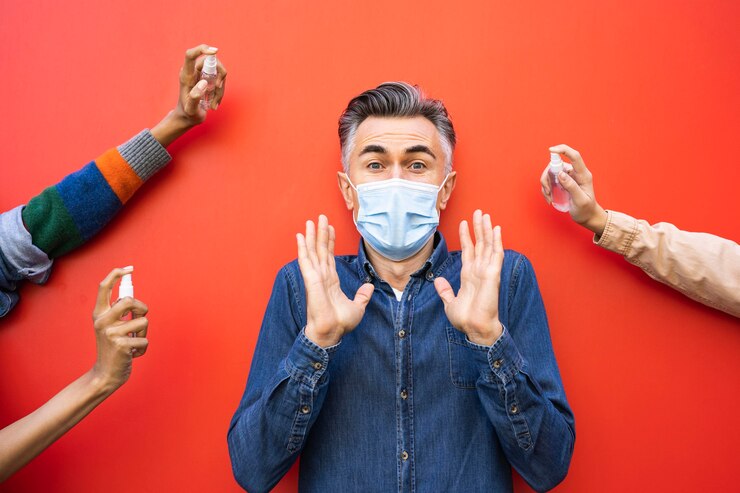Why Covid is still affecting some people
How to Stay Safe and Prevent the Spread of Covid-19 today?
This query has been on my mind ever since a friend shared their surprising experience of being greatly affected by the virus. Their third encounter with Covid-19 was notably more severe than their previous ones. “I always believed that each subsequent bout of illness would be milder,” they expressed from their sickbed. This sentiment has been echoed throughout the pandemic. Here we discuss about Why Covid is still affecting some people?
However, I have also encountered colleagues, interviewees, and fellow parents at the school gates who have recently endured the harsh impacts of Covid-19. A common narrative emerges, involving a week filled with coughing, headaches, and fever, followed by lingering fatigue.
It is crucial to emphasize that Covid-19 has always manifested a wide range of symptoms. Even prior to the availability of vaccines, some fortunate individuals experienced minimal illness or remained asymptomatic altogether. For them, Covid-19 was merely a minor inconvenience, insufficient to prompt them to search their bathroom cabinets for a hidden lateral flow test. Nevertheless, experts in immunology caution that Covid-19 continues to cause severe infections, potentially surpassing previous instances and incapacitating individuals for weeks on end. So, what is causing this shift?
Our response to Covid-19 is determined by the interplay between the virus itself and our body’s defense mechanisms. The initial stages are particularly critical, as they determine the extent to which the virus infiltrates our bodies and the severity of the subsequent illness. However, diminishing immunity and the virus’s evolutionary changes are altering the balance of power.”
The Hidden Battle: Living with Ongoing Covid-19 Symptoms
Prof Eleanor Riley, an immunologist at the University of Edinburgh, has experienced her own distressing battle with Covid-19, which surpassed her initial expectations. She describes it as a “horrid” episode that was far more severe than anticipated. In her own words, she expresses concern about the dwindling levels of antibodies in people’s bodies. These antibodies act as microscopic warriors, attaching themselves to the virus and preventing it from infiltrating our cells. When antibody levels are high, they can swiftly neutralize the virus, resulting in a shorter and milder illness. However, with lower antibody levels, a greater amount of the virus manages to penetrate the body, leading to more severe symptoms.
The decrease in antibody levels can be attributed to the passage of time since the majority of the population received vaccinations or experienced prior infections, which provided an additional boost to their immune systems. Prof Peter Openshaw, a renowned expert from Imperial College London, emphasizes the significant impact of widespread and rapid vaccine distribution, particularly among young adults. Unfortunately, fewer people are being offered vaccinations this year compared to the previous winter, when all individuals over the age of 50 were eligible. Currently, only those over 65 or in at-risk groups have access to vaccines. Prof Openshaw acknowledges that he is not a pessimist, but he anticipates a large number of individuals falling severely ill for several days or weeks.
Some People Still Struggling with Covid-19?
Interestingly, even young and healthy people are experiencing severe bouts of Covid-19, highlighting the virus’s deceptive nature. Prof Openshaw warns of the potential for long-term effects, such as “long Covid.” He stresses the importance of taking the virus seriously and acknowledges its ability to cause significant illness even in those who are typically considered low-risk.
“He believes there is a strong likelihood that you may be vulnerable if you haven’t contracted Covid in the past year. The official stance of the UK government is to immunize individuals at high risk of Covid-related mortality or requiring hospitalization. This helps alleviate strain on the National Health Service. Professor Riley asserts: “However, this does not imply that individuals under the age of 65 will not contract Covid and experience significant discomfort. The repercussion of not providing booster shots to this population is an increase in the number of individuals taking time off work for one, two, or even three weeks during the winter.” Changes extend beyond the vaccination criteria, as the virus itself is also undergoing modifications.”
Reasons Behind Ongoing Covid-19 Symptoms?
Antibodies exhibit high precision since they depend on a close correspondence between the antibody and the virus segment to which they adhere. The efficacy of antibodies diminishes as the virus undergoes evolution to alter its appearance.
Prof Openshaw remarks: “The currently circulating viruses are immunologically quite distinct from the original virus utilized for developing early vaccines.” “Numerous individuals possess minimal immunity against Omicron viruses and their variants.” If you are experiencing symptoms of Covid that are more severe than previous episodes. It may be due to a combination of fading antibodies and mutating viruses.
This does not imply an increased likelihood of severe illness or the need for hospitalization. Another component of our immune system, T-cells, come into play once an infection has commenced. And they have been trained by prior infections and vaccinations. T-cells are less susceptible to confusion from mutating viruses as they identify and eliminate infected cells. “They will prevent severe illness and hospitalization, but during the process of eradicating the virus. There is collateral damage that leads to feeling unwell,” explains Prof Riley.
Depending on T-cells to combat Covid is what leads to muscle pain, fever, and chills. So, where does this leave the notion that Covid is progressing towards becoming a mild and harmless infection? There exist four other human coronaviruses, related to Covi0d, that cause symptoms similar to the common cold.
Prof Openshaw says that “we have not reached that point yet” with Covid, but “through repeated infections, we should develop natural immunity.” In the meantime, will some of us have to endure an unpleasant winter? “I’m afraid so,” says Prof Riley.



